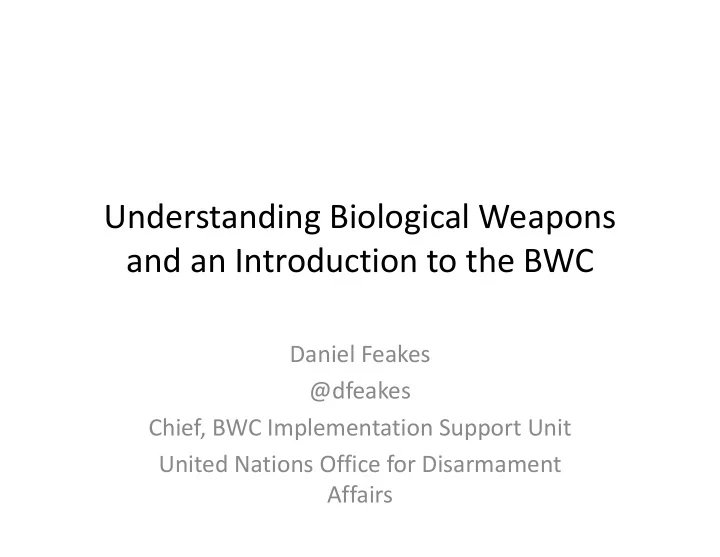

Understanding Biological Weapons and an Introduction to the BWC Daniel Feakes @dfeakes Chief, BWC Implementation Support Unit United Nations Office for Disarmament Affairs
Amb. Mazlan Muhammad, Malaysia
What are biological weapons? • Systems that disseminate disease ‐ causing organisms or toxins to harm or kill humans, animals or plants • Generally consist of two parts – a weaponized agent and a delivery mechanism • The agents can be enhanced to make them more suitable for mass production, storage and dissemination
“Public health in reverse”
“Determined, for the sake of all mankind, to exclude completely the possibility of bacteriological (biological) agents and toxins being used as weapons” “Convinced that such use would be repugnant to the conscience of mankind and that no effort should be spared to minimise this risk”
Definition • Each State Party to this Convention undertakes never in any circumstances to develop, produce, stockpile or otherwise acquire or retain: (1) microbial or other biological agents, or toxins whatever their origin or method of production, of types and in quantities that have no justification for prophylactic, protective or other peaceful purposes; (2) weapons, equipment or means of delivery designed to use such agents or toxins for hostile purposes or in armed conflict
Article I Never under any circumstances to acquire or retain biological weapons Article II To destroy or divert to peaceful purposes biological weapons and associated resources prior to joining Article III Not to transfer, or in any way assist, encourage or induce anyone else to acquire or retain biological weapons Article IV To take any national measures necessary to implement the provisions of the BWC domestically Article V To consult bilaterally and multilaterally to solve any problems with the implementation of the BWC Article VI To request the UN Security Council to investigate alleged breaches of the BWC and to comply with its subsequent decisions Article VII To assist States which have been exposed to a danger as a result of a violation of the BWC Article X To do all of the above in a way that encourages the peaceful uses of biological science and technology
Nuclear Chemical Biological Weapons Weapons Weapons Nuclear Chemical Biological Non ‐ proliferation Weapons Weapons Treaty Convention Convention International Organization for ? Atomic Energy the Prohibition of Chemical Weapons Agency
IAEA $368 MILLION CTBTO $130 MILLION OPCW $70 MILLION BWC $1.4 MILLION
Role of the RevCon “… a conference of States Parties to the Convention shall be held at Geneva, Switzerland, to review the operation of the Convention, with a view to assuring that the purposes of the preamble and the provisions of the Convention… are being realized. Such review shall take into account any new scientific and technological developments relevant to the Convention.” BWC Article XII
10 ‐ 14 August – Meeting of Experts 14 ‐ 18 December – Meeting of States Parties
Seventh Review Conference 2011 2012 – 2015 Intersessional Programme Procedures & Procedures & System of System of Confidence- Confidence- Mechanisms for Mechanisms for Building Measures Building Measures Responding to Responding to Use Use Standing Agenda Items Standing Agenda Items Assistance & Reviewing Strengthening Cooperation S&T Implementation “The purpose of the intersessional programme is to discuss, and promote common understanding and effective action”
192 173 BWC 1975 ‐ 2015 CWC 1997 ‐ 2015
BWC in the Americas 1. Haiti
BWC in Europe
BWC in the Middle East 1. Egypt 2. Israel 3. Syria
BWC in Asia and the Pacific 1. Kiribati 2. Micronesia 3. Nepal 4. Niue 5. Samoa 6. Tuvalu
BWC in Africa 1. Angola 2. Central African Rep. 3. Chad 4. Comoros 5. Côte d'Ivoire 6. Djibouti 7. Egypt 8. Eritrea 9. Guinea 10. Liberia 11. Namibia 12. Somalia 13. South Sudan 14. Tanzania
The BWC represents an “ironclad norm against the possession and use of biological weapons, and the abhorrence associated with the very idea of using disease as a weapon. How many States today boast that they are “biological weapon States”? Who argues now that the bubonic plague and smallpox are legitimate weapons to use under any circumstances?” Angela Kane, Former UN High Representative for Disarmament Affairs
Today, the norm against the use and possession of biological weapons remains strong, and no country identifies itself as possessing biological weapons. However, we must remain vigilant. The eighth Review Conference in 2016 is an opportunity to consolidate progress and consider how to adapt this landmark Convention to the challenges posed by advances in science and technology, … As we witness ever more remarkable breakthroughs in the life sciences, it is incumbent on us to ensure that such Ban Ki ‐ Moon, Secretary ‐ General of advances are used responsibly. the United Nations
For more information: BWC Implementation Support Unit United Nations Office for Disarmament Affairs Palais des Nations Geneva tel: +41 (0)22 917 2230 fax: +41 (0)22 917 0483 e ‐ mail: bwc@unog.ch www.unog.ch/bwc @BWCISU www.facebook.com/1972BWC
Recommend
More recommend